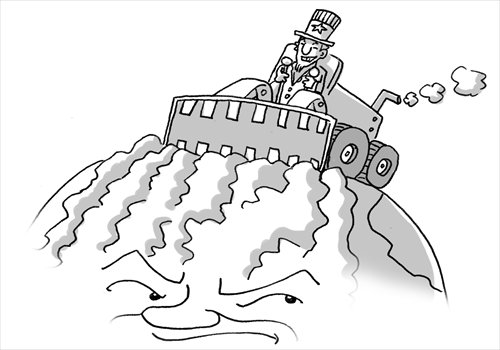By Li Kaisheng Source:Global Times Published: 2015-5-3 22:53:01

Illustration: Liu Rui/GT
Some 40 years ago on April 30, when the last American soldier crawled into a helicopter that flew away from the roof of the US Embassy in Saigon, leaving behind terrified Vietnam refugees, the US finally put an end to its failed intervention in Vietnam. The reflection provoked by the Vietnam War has never stopped affecting the thinking of US government and public about its foreign policy.
But US interventionism didn't end and instead it was practiced once and again via aircraft carriers and missiles from the Gulf War to the Kosovo War and from the war in Afghanistan to Iraq. Although these wars were launched for varied aims, they shared features of US interventionism, namely that Washington wants to alter local political and social climate with forces in a bid to achieve its self-proclaimed political and diplomatic goals.
US President Barack Obama puts the country's strategic focus on Asia and insists on being not directly involved in the crisis in Syria and Ukraine. This is a result of the US shift of geopolitical focus and doesn't mean an end to its interventionism. There are no crisis areas in the Asia-Pacific region where US military intervention is needed, which is enormously different from the Middle East. However, the interventionism with force may reappear in the US diplomatic agenda once certain scenarios demand it or the next US president shifts the geopolitical focus.
This intervention originates in the nation's belief that Americans are responsible for promoting freedom, democracy and human rights in the rest of the world by all means including military forces. As an important part of US diplomacy, this thought may fade for a while but will not disappear. It will come out in various forms when there is a chance.
It is this type of excessive confidence and self-conceit that creates most failures of interventionism. A nation's politics, security, economy and society eventually depend on its internal development, reform or overhaul rather than outside intervention.
But one important characteristic of US interventionism is to substitute a US pattern of governance for the role of local regimes in order to transform their original political, security and social situation. It has not only disrupted local development but risked backlash. This accounts for the failure in the Vietnam War and also the plight in the aftermath of the wars in Iraq and Afghanistan.
In an imperfect world, the necessity of intervention cannot be totally repudiated. The UN came up with the responsibility of protection and Chinese scholar Wang Yizhou has also put forward the idea of "creative involvement." However, no matter in what way the "involvement" is conducted, it cannot change the basic fact that a state and its people have the supreme rights to determine their own fate.
The US fulfilled its purposes in the Gulf and Kosovo wars because the military intervention had limits. It might have turned out differently if Washington acted in the way it did in Iraq or Afghanistan.
Surely it's not reasonable to simply say that the US suffered complete failure in Iraq and Afghanistan. It is the locals that have suffered the most pain from interminable chaos and grim security situation, which have greatly reduced the value of democracy and freedom.
It looks as if the US has also failed, but actually it has made gains.
In Iraq, the US got rid of its thorn in the flesh - the Saddam Hussein regime, while destroying a nest of the Taliban and Al Qaeda. While the number of terrorists in South Asia may increase, they are busy trying to survive and can spare little effort to wage attacks against the US. Since the 9/11 attacks, there has been no terrorist attack on US soil and the country has harvested various forms of geopolitical and economic dividends from the wars. These are all spoils of the wars in Afghanistan and Iraq.
In other words, the US looks like a loser, but it is in fact a winner and may have calculated these gains inwardly. It is probably such selfish calculations, combined with the US culture, that make the country unable to give up the interventionism.
Reflection on the Vietnam War should rest on not only the external US self-conceit but hidden national interests. Every country has its own selfish considerations, but the key is to realize that although in face of various problems, they shouldn't simply put their faith in the US. Likewise, the world can't simply count on the US to safeguard its peace and stability. Democracy, freedom and human rights should be the aspirations of every nation and its people, not cheap commodities delivered by US via interventionism.
The author is an associate research fellow at the Institute of International Relations, Shanghai Academy of Social Sciences. opinion@globaltimes.com.cn